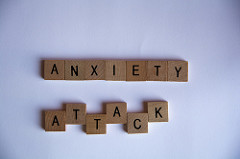Anxiety — All About It

Photo Credit/ Flickr- Practical Cures
January 27, 2016
According to Google Dictionary, anxiety is defined as “a feeling of worry, nervousness, or unease, typically about an event or something with an uncertain outcome.” Most people feel anxious because of a stressful or challenging situation. Sometimes, it can feel as if anxiety controls your life, and the sense of worry can seem overwhelming.
Symptoms of Anxiety
There are many symptoms of anxiety such as:
- Feeling of panic, uneasiness, and fear
- Cold and sweaty feet and or hands
- Sleeping problems
- The feeling that your heart is beating too fast, skipping a beat, fluttering, or beating too hard
- Having trouble staying calm
- Tingling in hands and feet
- Dry mouth
- Nausea
- Dizziness
- Muscle tension
What Are the Different Types of Anxiety?
There are several different types of anxiety, but the most common are panic disorder, social anxiety disorder, specific phobias, and generalized anxiety disorder. Once you learn and understand the different types of anxiety that may be present in your life, they can become easier to combat.
Panic Disorder—People with panic disorder usually have a fear or terror that comes out of nowhere. Some symptoms include chest pain, sweating, strong irregular heart beat, and a feeling of choking. This can cause the person to feel like they are having a heart attack or “going crazy.”
Social anxiety disorder is also called social phobia. It involves self-consciousness and overwhelming worry about everyday situations. The worry comes from the fear of being judged by others, and/or behaving in a way that can cause you to be embarrassed.
A specific phobia is the fear of an object or situation, such as spiders, heights, or planes. The fear is usually inappropriate to the situation and it may cause avoiding everyday situations.
Generalized anxiety disorder involves unrealistic, excessive worry and tension. There is usually little or nothing that provokes the anxiety.
Obsessive-compulsive disorder (OCD) is described as thoughts or behaviors that are unwanted that seem impossible to stop or control. OCD usually involves obsessions and compulsions that are recurring, such as washing your hands over and over.
What Causes Anxiety?
There is no exact cause of anxiety. Many scientists conclude that these disorders are caused by stress and changes in the brain. Studies have shown that people with anxiety disorders have changes in their brain that control memories and strong emotions. Anxiety orders can also be inherited from one or both parents. Certain environmental factors such as a significant event or trauma can also trigger anxiety.
How Common is Anxiety?
Anxiety disorders are the most common mental health problem. According to Pfizer, 1 in 4 adults will have an anxiety disorder in their lifetime, and 1 in 10 people will have an anxiety disorder each year. Anxiety disorders are the second most common mental health problem in men and the number one mental health problem in women.
How Are Anxiety Disorders Diagnosed?
If symptoms are present, a doctor will perform an evaluation with some questions about the patient’s medical history. The doctor will then perform a physical exam to see if any physical illnesses are the causes to the symptoms. If there are no physical illnesses to be found, the doctor will refer the patient to a psychiatrist for a diagnosis. The psychiatrist will evaluate the patient to see if they have an anxiety disorder. The doctor will evaluate the intensity of the symptoms and observe the patient’s attitude and behavior. The doctor will then determine if and what type of anxiety order the person has.
How Are They Treated?
- Medication, such as anti-depressants, can reduce the symptoms of the disorder that the person has.
- Psychotherapy can help the patient understand and deal with the disorder.
- Cognitive-behavioral therapy can help the patient learn to recognize and change their behaviors and thought patterns that lead to the bad feelings.
- Relaxation therapy.
- Lifestyle changes.
How to Prevent Anxiety Orders
Even though anxiety orders can not be prevented, there are some things you can do to lessen your symptoms.
- Reduce your consumption of caffeine.
- Ask your doctor if there are any remedies.
- Go to counseling if the feeling of anxiety is regular.
Even though anxiety is very common with adults and children, there are ways to cope and somewhat prevent it. I recommend going to a doctor to diagnose what type of anxiety you might have and how you can treat it.

